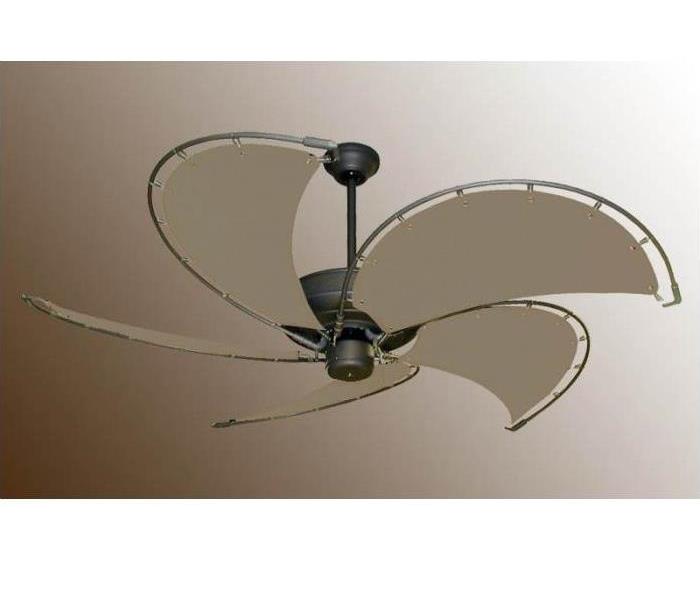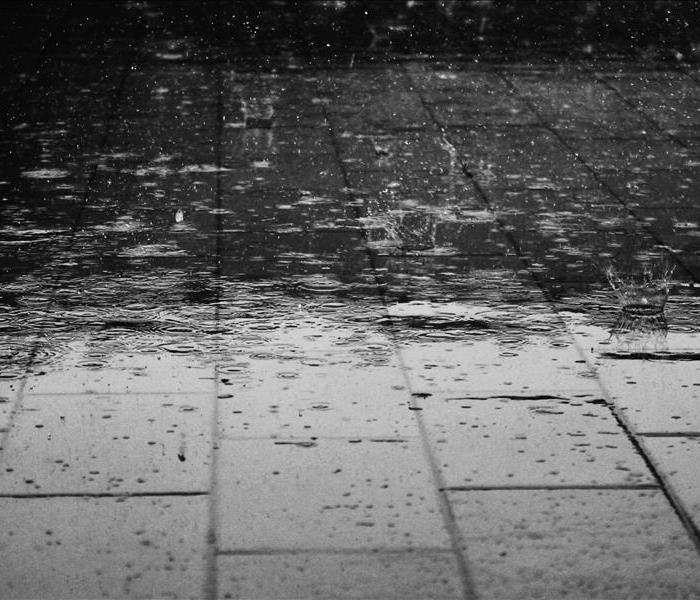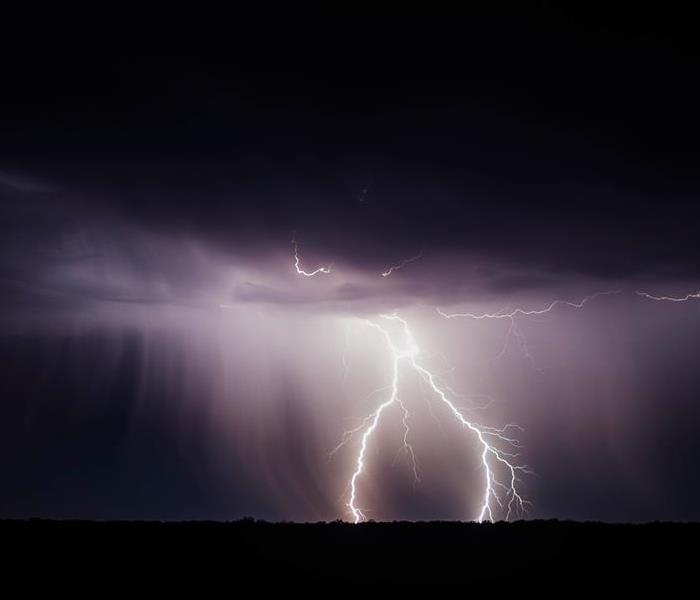Recent General Posts
A Winter Tip For Your Ceiling Fans
2/13/2017 (Permalink)
A Winter Tip For Your Ceiling Fans
During cold winter months, consider reversing your ceiling blade fans. In normal mode, ceiling fans spin in a counter-clockwise direction. Their blades are positioned to push air down, resulting in a cool breeze. But did you know by switching your ceiling fan to reverse (low speed), the fan now spins in the opposite direction which pulls air up towards the ceiling, driving the warm air that has risen naturally back down and redistributing warm air back to the edges of the room.
As for the warmer months, you will want the fan to move air straight down, so your ceiling fan will now need to run in a counter clockwise direction. As the temperature rises, increase the speed setting to cool the room.
Flooding Safety Tips
8/24/2016 (Permalink)
Floods are one of the most common and widespread natural disasters in the United States. Regardless of where your home may be located, there is always potential for flood damage.
Floodsmart.gov reports, in the last 5 years, all 50 states have experienced floods or flash floods. Just because you haven’t experienced a flood in the past, does not mean you won’t in the future. In fact, nearly 20% of all flood insurance claims come from moderate-to-low risk areas.
On average, floods cost $3.5 billion in annual losses in the United State.
According to the American Red Cross, floods cause more damage in the U.S. every year than any other weather-related disaster. American Red Cross offers the following flood safety tips:
Be Prepared:
- Water – at least a 3 day supply, one gallon per person per day
- Food – at least a 3 day supply of non-perishable food
- Radio – either battery powered or hand crank
- Extra batteries
- Multi-purpose tools
- First Aid Kit
- Copies of personal document (Insurance policies, birth certificates and etc.)
- Know what your homeowner’s insurance covers and/or doesn’t cover.
- Because standard homeowner’s insurance doesn’t cover flooding, it’s important to have protection from the floods associated with hurricanes, tropical storms, heavy rains and other conditions that impact the U.S. For more flood safety tips and information on flood insurance, please visit the National Flood Insurance Program Web site at FloodSmart.gov.
- Camera – to photograph damages
Responding Appropriately During a Flood:
- Be prepared to evacuate at a moment’s notice
- Stay away from floodwaters which may contaminated
- Keep children away from water.
Flood Recovery Tips:
- Return home only when officials declared the area as being safe.
- Approach home carefully, look for loose power lines, cracked foundation, and other damages.
- Watch out for wild animals, especially poisonous snakes that may come into your home through flood water.
- If you smell natural or propane gas or hear hissing, get out and call fire department
- During cleanup, wear protective clothing, including rubber gloves and boots.
If a flood does strike your home or business, contact SERVPRO of Milford-Orange-Stratford. Even minor floods have the potential to cause major damage to a structure when not treated properly. Cleanup can often be an overwhelming task. SERVPRO of Milford-Orange-Stratford is prepared to handle any size disaster, to make it like it never even happened!
Be Severe Weather Ready
8/8/2016 (Permalink)
Be Severe Weather Ready
Severe weather can happen anywhere and at anytime. Each year, Americans can experience an average of the following intense storms:
· 10,000 severe thunderstorms
· 5,000 floods or flash floods
· 1,000 tornadoes
· 2 land falling deadly hurricanes
Approximately 98% of all presidentially declared disasters are weather-related, leading to around 500 deaths per year and nearly $15 billion in damage. Knowing your risk of severe weather, taking action and being an example are just a few steps you can take to be better prepared to save your life and assist in saving the lives of others.
Know Your Risk. The first step to being weather-ready is to understand the type of hazardous weather is to understand the type of hazardous weather that can affect where you live and work, and how the weather could impact you, your business and your family. Check the weather forecast regularly and obtain a NOAA Weather Radio. Severe weather comes in many forms and your shelter plan should include all types of local hazards.
Take Action. Take the next step in severe weather preparedness by creating a communication plan for your home and business. Put together or purchase an emergency kit. Keep important papers and valuables in a safe place.
Be an Example. Once you have taken action to prepare for severe weather, share your story with co-workers and family and friends on Facebook or Twitter. Your preparedness may inspire others to do the same.
Tips to Help Prevent Your Pipes From Freezing:
1/6/2016 (Permalink)
Winter is in full effect! In an effort to help keep your pipes from freezing, consider the following tips:
Outdoor Care:
Disconnect all garden hoses and if there is water shut off valve, turn it off! Also, consider installing covers on exterior water supplies.
Prevent the water meter from freezing during cold weather by keeping it securely covered.
Indoor Care:
Identify the location of the main and water heater shut-off(s). Knowing the location of these valves can come in handy during an emergency and could help prevent further damages.
Be sure that your home’s thermostat is NOT below 60 degrees.
Leave cabinet doors below sinks open to allow heat from home to circulate.
Close all windows and seal any gaps open to the outside elements, especially those near water pipes. Freezing temperatures combined with wind drafts can cause pipes to freeze.
Insulate pipes that are near exterior walls or in unheated spaces of your home. This can prevent freezing, especially for interior pipes that may run along outside walls.
Seal leaks that allow cold air into your home by weather strip, caulking or insulating. Check air leaks around flue or chimney chase, electrical wiring, dryer vents and pipes. Also, consider insulating outside walls that are in unheated spaces of a home.
If away, shut off water supply valves to your washing machine.
Leave lukewarm water dripping slowly from faucets during extremely cold periods. Water moving through the system should prevent lines from freezing.
If a Pipe Bursts:
Shut off water at the main valve.
If the break is in a hot water pipe, the valve on top of water heater should also be turned off.
Call a plumber immediately! Then call SERVPRO of Milford-Orange-Stratford to make it like it never even happened!
Holiday Safety Tips:
11/24/2015 (Permalink)
Holiday Safety Tips:
Candles, pretty lights and decorations are just a few of the items that add to the charm and cheer of the holiday season, however, if they are not used carefully your holidays may go from festive to frightening very quickly.
Below are safety tips provided by the National Fire Protection Association, to greatly reduce the fire risk in your home this holiday season.
Two out of five home decoration fires are started by candles. Keep candles at least three feet away from anything that burns.
Use sturdy candle holders that are not likely to tip over and place candles on clear, uncluttered surfaces.
Never leave candles unattended.
Consider using flameless candles instead of real candles.
Make sure you have the correct type of light for your desired décor. Some lights are designed for only indoor or outdoor use, but not both.
Carefully inspect light strands before placing them. Replace any string of lights with worn or broken cords or loose bulb connections. Connect no more than three strands of light sets.
Get rid of your tree after Christmas or when it is dry. Dried-out trees are a fire danger and should not be left in the home or garage. Check with your local community to find a recycling program.
Remember to turn off outside decorative lights and Christmas tree lights before leaving or going to bed.
Bring outdoor electrical lights inside after the holidays to prevent hazards and make them last longer.
Smoke alarms save lives! Install smoke alarms on each level of your home, near kitchen and sleeping areas. Don’t forget to replace all batteries at least once a year.
SERVPRO of Milford-Orange-Stratford wishes you a safe and happy holiday season!





 24/7 Emergency Service
24/7 Emergency Service


